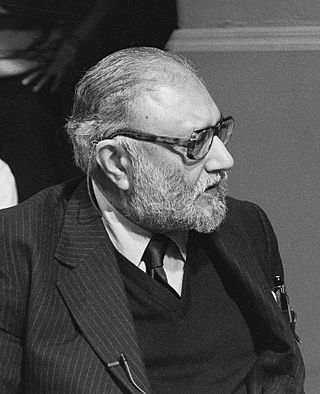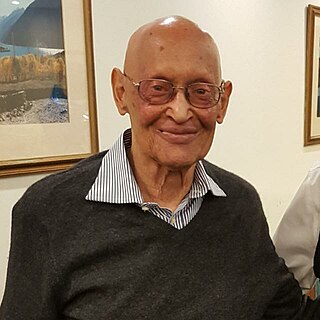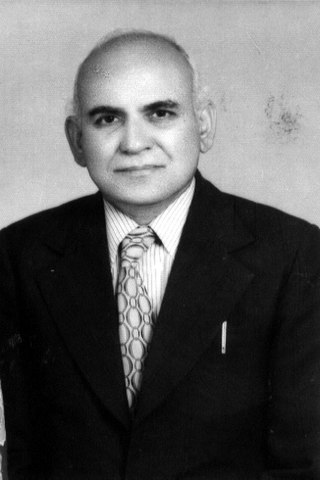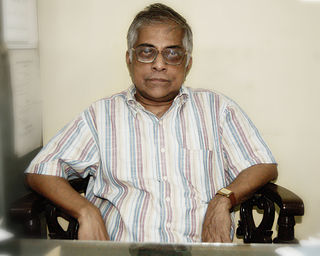Related Research Articles

Mohammad Abdus Salam was a Pakistani theoretical physicist. He shared the 1979 Nobel Prize in Physics with Sheldon Glashow and Steven Weinberg for his contribution to the electroweak unification theory. He was the first Pakistani and the first scientist from an Islamic country to receive a Nobel Prize and the second from an Islamic country to receive any Nobel Prize, after Anwar Sadat of Egypt.

The Government College University is a public research university in Lahore, Punjab, Pakistan. GCU is ranked among the most prestigious academic institutions in Pakistan. Founded as Government College, Lahore, in 1864 under British administration, it became a university in year 2002.
Khalid Hasan was a Pakistani journalist and writer. Author and editor of several books, in addition to being a regular columnist for a number of English-language Pakistani newspapers, he is best known for his translations of the short stories of Saadat Hasan Manto and the lyrics of Faiz Ahmed Faiz.

The University of the Punjab, also referred to as Punjab University, is a public research university located in Lahore, Punjab, Pakistan. It is the oldest and largest public sector university in Pakistan.

The Abdus Salam International Centre for Theoretical Physics (ICTP) is a research center for physical and mathematical sciences, located in Trieste, Friuli-Venezia Giulia, Italy.
Abdullah Sadiq, is a Pakistani physicist and ICTP laureate who received the ICTP Prize in the honour of Nikolay Bogolyubov, in the fields of mathematics and solid state physics in 1987 for his contributions to scientific knowledge in the field of mathematics and statistical physics. He is the professor of physics and current dean of the department of physics of the Air University of the Pakistan Air Force (PAF).
Abid Ali Abid was a Pakistani Urdu and Persian poet and educator who was born on 17 September 1906 in Dera Ismail Khan, British India and died in Lahore, Pakistan on 20 January 1971.

Riazuddin, also spelled as Riaz-Ud-Din, was a Pakistani theoretical physicist, specialising in high-energy physics and nuclear physics. Starting his scientific research in physics in 1958, Riazuddin was considered one of the early pioneers of Pakistan's nuclear weapons development and atomic deterrence development. He was the director of the Theoretical Physics Group (TPG) of the Pakistan Atomic Energy Commission (PAEC) from 1974 until 1984. Riazuddin was a pupil of the winner of the 1979 Nobel Prize in Physics, Abdus Salam.
Muhammad Masud Ahmad, best known as Masood Ahmad, was a Pakistani theoretical physicist and ICTP laureate known for his work in dual resonance and Veneziano model, a strings sting mathematically described the fundamental forces and forms of matter in quantum state.
Noor Muhammad Butt ; b. 3 June 1936), SI, FPAS, also known as N. M. Butt, is a Pakistani nuclear physicist and professor of physics at the Preston University who is known for his research publications in understanding the gamma-rays burst, Mössbauer effect, diffraction, later the nanotechnology.

Ghulam Murtaza, SI, FPAS, is a Pakistani theoretical physicist with a specialization in the physics of ionized plasmas, and is an Emeritus Professor of physics at the Government College University in Lahore. Murtaza's work is recognizable in plasma physics and controlled nuclear fusion processes to provide a better understanding of energy propagated by the main-sequence star, the Sun.
Chaudhry Abdul Majeed was a Pakistani nuclear chemist, nuclear weapon and reactor expert. He is known as one of the pioneers of Pakistan's nuclear weapon programme, and has worked closely with former Pakistan Atomic Energy Commission (PAEC) Chairman Munir Ahmad Khan's plutonium reprocessing project. He rose to prominence when he was apprehended by Pakistan's intelligence agencies in a joint operation in late October 2001. Majeed was also one of the founding members of Sultan Bashiruddin Mahmood's Ummah Tameer-e-Nau organisation; an NGO which caused an international embarrassment for Pakistan.

The National Centre for Physics is a federally-funded research institute and national laboratory co-located near Quaid-i-Azam University.
Faheem Hussain, was a Pakistani theoretical physicist and a professor of physics at the Lahore University of Management Sciences (LUMS). A research scientist in the field of superstring theory at the National Center for Physics, Hussain made contributions to the fields of superstring and string theory. He was the first Pakistani physicist to publish a research paper in the field of superstring theory. A social activist and democratic activist, he authored various scientific research papers in peer-reviewed journals.

Asghar QadirHI, SI, FPAS, is a Pakistani mathematician and a prominent cosmologist, specialised in mathematical physics and physical cosmology. Nowadays, he is widely considered one of the top mathematicians in Pakistan. Asghar has played a prominent role in promoting Relativity in Pakistan. To this day, Qadir has made important and significant contributions to the fields of differential equations, theoretical cosmology and mathematical physics. He is noted for his work in mathematics and mathematical physics, in particular his contributions to general relativity and cosmology.
Fayyazuddin, also spelled as Fayyaz Uddin, is a Pakistani theoretical physicist, emeritus professor, specialising in theoretical physics and mathematical physics at Quaid-e-Azam University campus National Centre for Physics, Islamabad. He is a senior scientist at the National Center for Physics. Fayyaz is doing research in the fields of quantum mechanics, particle physics, and meson physics. He has published numerous physics papers accompanied by Riazuddin and has co-authored Quantum Mechanics by Fayyazuddin and Riazuddin published in 1990.

Manzoor Ul Haq Siddiqi was a Pakistani educationist, historian and an author. He served in Cadet College Hasan Abdal from 1954 until his retirement in 1980.

Amitava Raychaudhuri is an Indian theoretical particle physicist. He is Professor Emeritus at the Physics Department of the Science College, University of Calcutta where he earlier held the Sir Tarak Nath Palit Chair Professorship. He is the nephew of another renowned Indian physicist, Amal Kumar Raychaudhuri.
Mohammad Saleem was a Pakistani particle physicist and a professor of physics at the Punjab University. He was the founding director of the Centre for High Energy Physics, and author of mathematical physics book, Group Theory for High Energy Physicists, published in 2016.
Dr. Shahid Siddiqui is a Pakistani academic, educationist, researcher, and writer. He served as Lecturer at Virtual University of Pakistan, Lahore and Vice-Chancellor of Allama Iqbal Open University, Islamabad from 2014 to 2018. He was succeeded as VC AIOU by Dr. Nasir Mahmood in October 2018. Currently, he is working as Dean of Social Sciences with the National University of Modern Languages, Islamabad.
References
- ↑ "Professor Mujahid Kamran". University of the Punjab website. Archived from the original on 9 February 2011. Retrieved 28 November 2021.
- 1 2 3 4 5 6 7 8 9 10 11 12 13 14 Lodhi, Adnan (4 January 2008). "Prof Dr. Mujahid Kamran appointed new PU VC". Daily Times (newspaper). Archived from the original on 9 January 2008. Retrieved 28 November 2021.
- 1 2 3 4 5 6 7 8 Kamran, Mujahid (7 July 2015). "Curriculum vitae (CV)" (PDF). Archived from the original (PDF) on 5 November 2015. Retrieved 28 November 2021.
- ↑ Muḥammad, Aḥmad, 'Abd El-Gādir (1993). "Dual absortive model and elastic hadronic scattering at high energies and small momentum transfers". hdl:1842/15135.
{{cite journal}}: Cite journal requires|journal=(help)CS1 maint: multiple names: authors list (link) - ↑ ICTP (3 September 1998). "ICTP Associates honored...Again". ICTP website – Public Information Office. Archived from the original on 18 May 2012. Retrieved 29 November 2021.
- 1 2 ICTP (December 2008). "Appointments and Honours" (PDF). News from ICTP. p. 14. Archived (PDF) from the original on 8 March 2012. Retrieved 29 November 2021.
- ↑ "A Troubled Relationship". Dawn (newspaper). 18 July 2010. Archived from the original on 4 March 2016. Retrieved 28 November 2021.
- ↑ Mujahid Kamran, Syed Ghulam Sarwar (2013). 9/11 and the New World Order. University of the Punjab. ISBN 978-9699325137. Archived from the original on 29 June 2016. Retrieved 29 November 2021.
- ↑ "9/11 – An Analysis". Archived from the original on 22 February 2016. Retrieved 29 November 2021.
- ↑ "American people the finest group of mankind: PU VC - University of the Punjab - Press Release".
- 1 2 "9/11 and the New World Order: Mujahid Kamran reveals plot to take over the world". The Express Tribune (newspaper). 11 September 2013. Retrieved 29 November 2021.
- ↑ "End of the US as a Democracy". The Nation (newspaper). 12 October 2010. Archived from the original on 18 March 2015. Retrieved 29 November 2021.
- ↑ Kamran, Mujahid (28 September 2010). "The Decay of U.S. Courts". The Nation (newspaper). Archived from the original on 22 June 2015. Retrieved 29 November 2021.
- ↑ Kamran, Mujahid (19 October 2010). "Drugs, US corporations and CIA". The Nation (newspaper). Archived from the original on 16 April 2014. Retrieved 29 November 2021.
- ↑ Kamran, Mujahid (2 November 2010). "Canadian sovereignty?". The Nation (newspaper). Archived from the original on 4 March 2016. Retrieved 29 November 2021.
- ↑ Kamran, Mujahid (21 November 2010). "Abdus Salam at Cambridge". The Nation (newspaper). Archived from the original on 29 January 2015. Retrieved 29 November 2021.